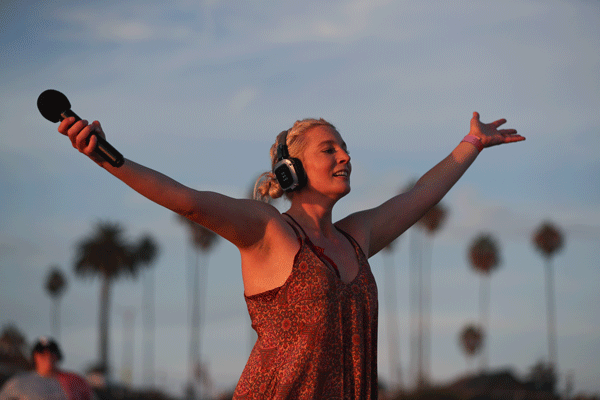āI feel God gave me that gift to be on both sides.ā
Rick Reiss grew up on the border between hearing and deafness. As an adult, he has combined a daytime job in the hearing world with a special career in the night life of the hearing-impaired. Reiss lives in Van Nuys.
My parents didnāt know I was hard of hearing until I was 5 years old. I first knew I had a hearing problem because my mother took me to the doctor a lot for hearing examinations. But I didnāt understand the importance of good hearing. I had a bad speech impediment, so I had a lot of speech therapy. I used to go about three or four times a week. Iām so grateful that my parents did that for me. I know people who have better hearing than I do but their speech is a lot worse than mine only because I had that therapy from when I was 5 to about 10 or 11 years old.
In school, when I was in hard-of-hearing classes, I was above those students. I did too well. But in hearing classes I would sit up front, and I would still miss one or two words in a lecture, and it would ruin my concentration, and Iād get behind. Either way I couldnāt win.
In eighth and ninth grades I was the only hearing-impaired kid in the whole school. They used to make fun of me, and I would get into fights a lot. It was horrible. I really didnāt have the kind of personality so I could laugh at it then. When people tease you and make fun of you at that age, you just donāt know how to deal with it. I can look back on it now, and Iām kind of glad I went through that. It taught me a lot about life. It taught me that you have to accept yourself the way you are.
When I got out of high school, it was the Vietnam era, when we fought the war, and the hippie generation. Deep down inside I liked business, but I didnāt pursue it. In those days people were anti-capitalistic. So I didnāt go into it, because I think I was afraid to be different.
In 1979 I started doing Deaf Disco, and thatās when I knew I liked business. It was like I snapped out of it. When I had these flyers made up and passed them out, I remember the looks on peopleās faces. Theyād go, āWow!ā they were so excited. When I first started, disco was really hot. Remember āSaturday Night Fever?ā That gave me the idea. I called mine Sunday Night Fever. The flyer said, āLoud music, flashing lights, the first Deaf Disco in Southern California.ā I had backgammon tables, dancing, free popcorn, giant TV screen and cocktails with interpretive waitresses. On the first Sunday night we had a long line outside, and they had a great time, and it made me feel really good. From that time on, itās been really successful.
If one or two deaf people go to a nightclub filled with hearing people, theyāre going to feel out of place. They canāt talk to anybody. So when I put on these parties for them, it gives them the comfort of being with their own kind of people. They can ask a girl to dance without being intimidated. They can sign with each other. They can communicate.
Sign language is a language in itself. Itās a beautiful language, because you use a lot of facial expression. You can tell how much emphasis they are putting on something by their expression. Just by seeing it on their face, you can read it. Itās like a picture painted across. Itās beautiful.
Iāve been doing Deaf Disco for seven years, but I also have another job as a cable TV service technician. Iām a cable doctor. Thatās what I like to call myself. The experience that Iāve had in customer relations in my disco business has carried over to my job--being patient, considerate and understanding and trying to give them good service. If a personās TV snows out, theyāre upset. My job is to find the problem and make them happy. Thatās my job, and thatās my satisfaction.
Iāve been on both sides. Iāve been in the hearing world, and Iāve been in the deaf world. Itās given me a lot of compassion for people. To me, thatās a gift. I feel God gave me that gift, for whatever reason, to be on both sides. I feel fortunate.
More to Read
Sign up for Essential California
The most important California stories and recommendations in your inbox every morning.
You may occasionally receive promotional content from the Los Angeles Times.










